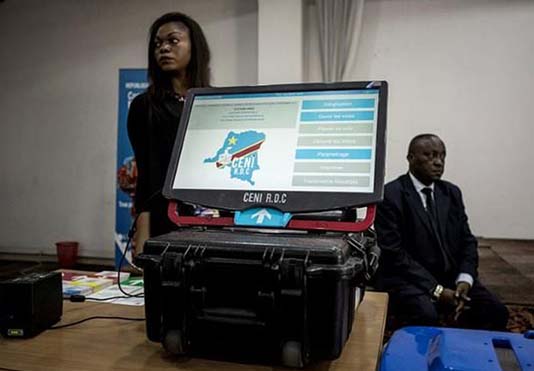KINSHASA, Jan 4, 2019 (BSS/AFP) – DR Congo’s powerful Roman Catholic
Church on Thursday said it knows who has won a much-delayed presidential vote
and urged the electoral commission to publish the “truth”.
The appeal from the National Episcopal Conference of Congo (CENCO) came
hours after the election commission said logistical problems may force it to
postpone publication of provisional results from Sunday’s ballot.
“Data in (CENCO’s) possession from the vote counting reports from polling
stations designates the selection of one candidate as president,” said
spokesman Father Donatien Nshole.
It called on the election panel “to publish the election results in keeping
with truth and justice,” he said.
Western powers and DRC’s neighbours hope sub-Saharan Africa’s biggest
country will see its first peaceful transition of power since independence in
1960.
The United States demanded that “accurate” election results be released,
warning of sanctions against anyone who undermined the fledgling democracy.
Washington also called on the DRC authorities to remove restrictions on
internet access and media and urged the Independent National Election
Commission (CENI) to count votes in a transparent way.
“There are moments in every nation’s history when individuals and political
leaders step forward and do the right thing. This is one of those moments for
the DRC,” US State Department spokesman Robert Palladino said in a statement.
The UN Security Council will on Friday hold a closed-door meeting,
requested by France, about the elections, diplomats said. The council is
scheduled to hold a public meeting on Tuesday.
– Journalist forced to leave –
The French public-service broadcaster Radio France Internationale (RFI)
which has a huge following in DRC said its correspondent Florence Morice was
forced to leave the country on Thursday night, after having her accreditation
revoked.
Congolese authorities have blocked RFI’s broadcasts after accusing it of
fanning controversy by declaring early results — an allegation it denies.
President Joseph Kabila, 47, should have stepped down at the end of 2016
when his constitutionally-limited two terms expired.
But he invoked a caretaker clause in the constitution to stay on, sparking
protests which were ruthlessly crushed, leaving scores dead.
Elections to succeed him were delayed several times before they finally
took place, and were further postponed in several areas hit by violence.
Tensions have risen further over the marathon counting process with
opposition fears running high that the result will be rigged to favour
Kabila’s preferred successor, Emmanuel Ramazani Shadary.
– ‘We are doing our best’ –
CENCO says it deployed more than 40,000 observers to monitor Sunday’s vote,
the first presidential ballot since 2011.
Monitors noted some “irregularities” in Sunday’s voting, Father Nshole
said.
But, he stressed, “these were not able to significantly affect the choice
which the Congolese people clearly expressed through the ballot box.”
The election commission CENI has scheduled to unveil the provisional
results on Sunday, followed by the definitive results on January 15 and
inauguration of the next president three days later.
But on Thursday, CENI chief Corneille Nangaa told AFP that provisional
results may be delayed.
“We are working around the clock. We are doing our best to publish the
results on January 6. But if we can’t, we can’t,” Nangaa said.
Nangaa later told a news conference that election officials had collected
about 20 percent of the results needed. Results from all 73,000 voting
stations would then be consolidated, he said.
– Rebuke from Paris –
Within hours of clearing the first hurdle of potential violence on polling
day, the elections ran into their next challenge — claims of victory and
entrenched suspicions about electoral fraud.
Kabila’s champion Shadary, a hardliner and former interior minister, and
Emmanuel Tshisekedi, head of the UDPS, the country’s oldest and largest
opposition party, each said they had won.
But the few opinion polls conducted before the vote signalled Martin Fayulu
— a little-known legislator and former oil executive — as the clear
favourite.
The move to cut internet access and block RFI broadcasts drew a sharp
rebuke from Paris on Thursday.
Respect for freedom of the press and expression was “a key element in
guaranteeing the transparency and credibility of the ongoing electoral
process,” a foreign ministry spokesman said.
The DRC lived through two wars between 1996 and 2003 that claimed millions
of lives through bloodshed, fighting, starvation and disease.
Violence also marred elections in 2006 and 2011.



